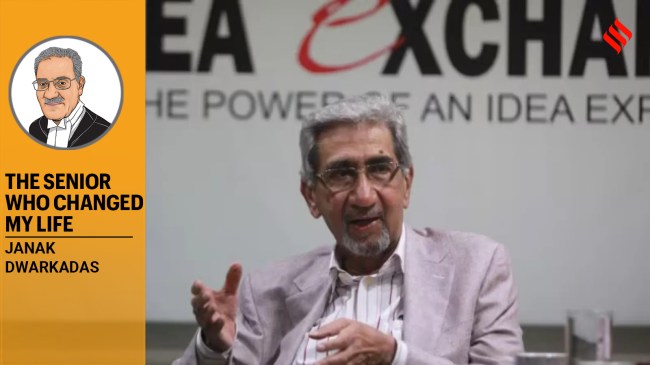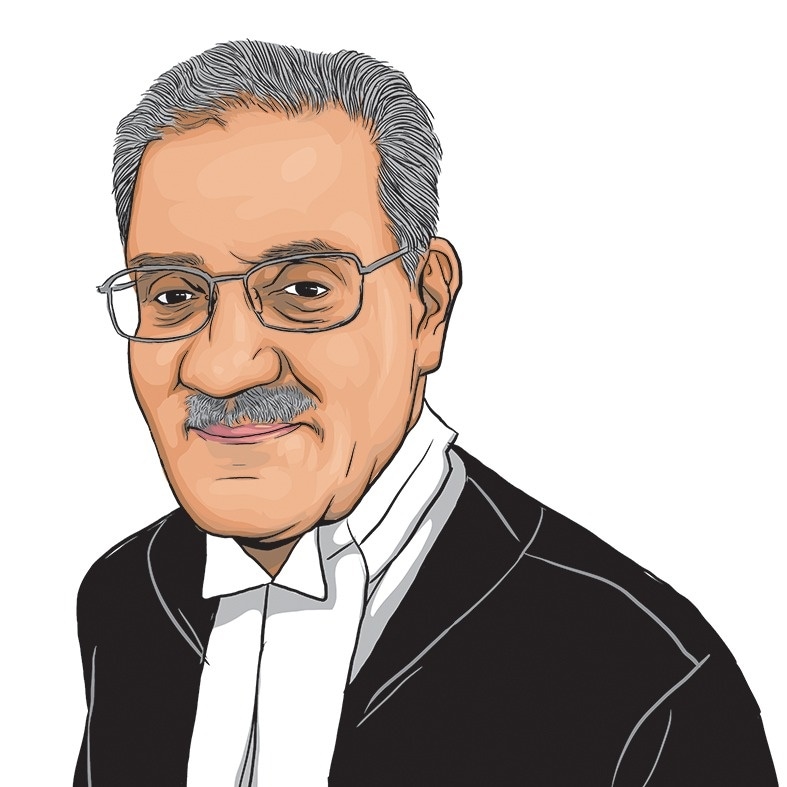Opinion Iqbal M Chagla, the senior who changed my life
He was my pillar of support. With his sharp intellect, great oratory, he towered above his seniors and colleagues at the bar
 Mickey, I wish you farewell in your onward journey to eternity. You will be missed by many, but never forgotten by those who were fortunate enough to have known you.
The writer is a senior advocate
Mickey, I wish you farewell in your onward journey to eternity. You will be missed by many, but never forgotten by those who were fortunate enough to have known you.
The writer is a senior advocate The lineage of all thoroughbred horses can be traced back to three legendary Arabian stallions — Darley Arabian, the Byerley Turk, and the Godolphin Arabian. Similarly, the legacy of some of India’s greatest legal minds can be traced to the chambers of Sir Jamshedji Kanga on the Original Side of the Bombay High Court. His chambers came to be famously known as “Chamber No. 1”. Chamber No. 1 has been the cradle of some of the greatest legal minds and jurists of the country — Bhulabhai Desai, Motilal Setalvad, H M Seervai, Nani Palkhivala, right down to Kharshedji Bhabha. Three of Kharshedji’s most distinguished juniors were Fali S Nairman, Soli J Sorabjee and my own senior Iqbal M Chagla, who we fondly called Mickey. Mickey’s own pedigree was no less. His father M C Chagla was the first Indian Chief Justice of the Bombay High Court and a great jurist.
Mickey reminded me of Edmond Dantès, the protagonist from The Count of Monte Cristo by Alexander Dumas. Like Dantès, he was a tall, imposing and swashbuckling figure with a French goatee. His barrister’s half jacket, worn beneath his counsel’s gown, gave the impression of a flowing cape, reinforcing the image of Dantès. The only thing missing was the sword slung in a scabbard at his waist. Yet, Mickey wielded a far more formidable and potent weapon — his magnificent voice and his powerful oratory with which he could vanquish almost every opponent.
By reason of his professional integrity and high ethical standards, Mickey commanded the highest respect in whichever court he walked into. Although he was not a Commerce graduate, by dint of his hard work and ability to understand and digest the most complex of problems, he soon became one of the foremost commercial lawyers in the country. In addition, his uncluttered mind, sharp intellect, coupled with the greatest oratory I have ever seen, placed Mickey head and shoulders above his colleagues and even seniors at the bar.
Mickey had an extremely versatile practice which extended to commercial, corporate, intellectual property rights, constitutional law as well as trials in civil cases. What I found most interesting about his style of cross-examining witnesses in civil trials was his ability to lull the witness into a false sense of security before tightening the noose. He did this by being gentle and respectful rather than browbeating the witness.
When I joined Mickey as a junior, what struck me about him was his equanimity. At the same time, he had the uncanny ability of getting to the nub of the problem almost instantaneously and with
remarkable accuracy.
Mickey was a true leader, inspired by Albert Camus’ belief that courage is essential. As president of the Bombay Bar Association, he boldly moved a resolution against five Bombay High Court judges, questioning their integrity and calling for their resignation, despite warnings of contempt. His actions led to one judge resigning, two being transferred, and two losing judicial work. Five years later, he spearheaded another resolution against a corrupt chief justice, resulting in his resignation. Mickey undertook these challenges not for personal gain but because he believed that judicial independence depends on the strength and integrity of the lawyers before them.
The Original Side of the Bombay High Court has a unique tradition where law graduates join the chambers of established seniors. Unlike other regions where juniors are salaried, no remuneration is expected or paid. The goal is to let juniors attend conferences, read briefs, assist, and accompany seniors to court, learning advocacy in all its facets. More than training, this tradition fosters a lifelong guru-shishya bond that transcends the professional relationship. I was privileged to share such a relationship with Mickey. Though I trained under him for about nine years, our association lasted until his passing this year. He was my trusted confidant, guiding me through career and personal decisions.
The work-life balance Mickey encouraged has stayed with me through the years. In his chambers, I learned that work was work and play was play. I cannot forget the wonderful times I had as a junior in what we called the “tea club.” This was a short time after court when we gathered for tea and snacks. The first rule was to keep work and court matters off the table, allowing for light-hearted conversations and jokes that kept everyone in good spirits. Once the “tea party” ended, we returned to work with full focus.
Mickey taught me not to take myself seriously. Whenever he would see me looking tense or anxious, he would remark “Is the sky falling on your head?”. The wisdom of his words, “There is a life beyond the law”, has been a foundation for me to continue pursuing my multiple interests. I encourage my juniors to do the same.
Mickey was unpretentious — on one occasion when his wife Roshan could not fetch him from chambers, he requested me to give him a ride. I used to own a motorbike in those days. He gladly sat pillion with his black coat, tie and pipe in hand which made my friend, Jimmy, remark — it was the first “chauffeur-driven bike.”
The adage “behind every successful man, stands a woman,” could very well have been written keeping Roshan in mind. She played a significant role in his life and extended her warmth, love and affection to all his juniors. Both were my strong pillars of support through the ups and downs of my life.
While I mourn the loss of Mickey, I pay tribute and celebrate the life of a person who has played a unique and special role in my life. Mickey, I wish you farewell in your onward journey to eternity. You will be missed by many, but never forgotten by those who were fortunate enough to have known you.
The writer is a senior advocate






